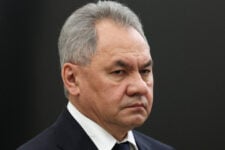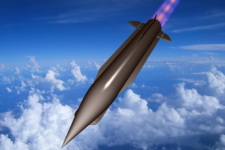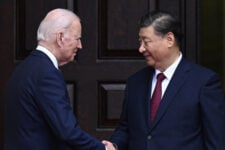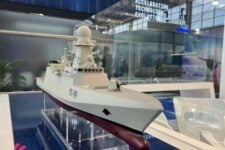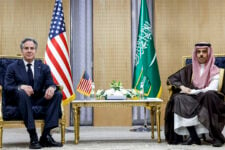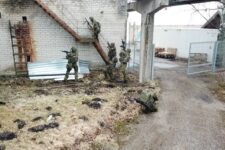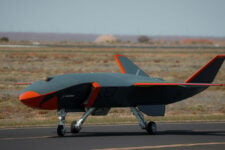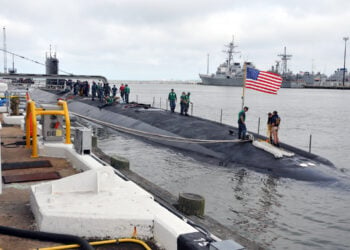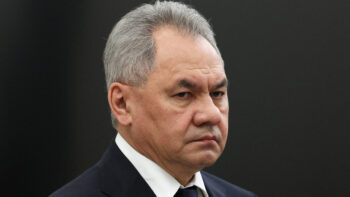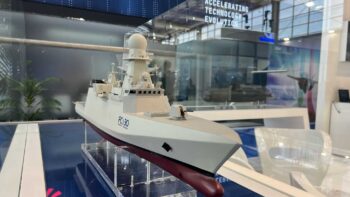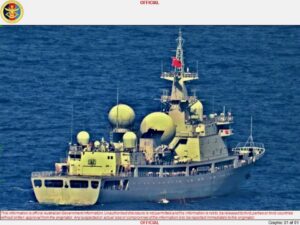
People’s Liberation Army-Navy (PLA-N) Intelligence Collection Vessel Haiwangxing operating off the north-west shelf of Australia. (Australian MoD)
SYDNEY: Eight days before a heavily-contested federal election, Defense Minister Peter Dutton today revealed that a Chinese intelligence ship had entered Australia’s exclusive economic zone and was “hugging the coastline” near highly classified facilities, in what he called “an aggressive act.”
While Prime Minister Scott Morrison’s Liberal Party government has regularly flagged Chinese actions over the last 18 months, the timing of this release by Dutton raised questions about whether it was tied to the looming election, given that Australia has been monitoring the ship ‘for the past week or so.”
Prime Minister Scott Morrison maintained an even keel in his comments about the ship today.
“They’ll keep a close eye on us and I can assure you, Australia, in our national interest, will always be keeping a close eye on them,” Morrison said. “I certainly don’t believe that when you take it together with the many coercive acts and the many statements that have been made attacking Australia’s nation interest, you could describe it as an act of bridge-building or friendship.”
The PLAN ship passed within 17 nautical miles of the Harold E Holt naval station base near the Western Australia town of Exmouth, which boasts a VLF transmission facility for communications with submarines. Passage that far south on the western coast clearly attracted Australia’s interest. “It is an aggressive act particularly because it has come so far south — for it to come south of Exmouth is without precedent,” Dutton said at his press event.
Greg Sheridan, foreign editor for the The Australian newspaper and a respected defense observer, said in a column for the paper that his country isn’t really able to effectively counter the PLAN in such circumstances.
Australia’s “new big patrol craft, the size of a small destroyer, carries no weapons of military grade,” he wrote. “Our eight small ANZAC frigates would similarly be wildly over matched against modern Chinese war ships. And we do not have enough aeroplanes to be sure even of full scale surveillance everywhere we like.”
Home Affairs Minister Karen Andrews implied the ship’s journey may have been timed to coincide with the Australian elections: “We all understand that China is very strategic and is very careful about what it does, when it does it, and how it does it.”
Dutton did not answer a reporter’s question about whether he had flown to Western Australia to make the announcement, pointing to what he called “operational reasons.” He did deny the statement was made because of the elections.
The.Dongdiao class auxiliary intelligence ship, Haiwangxing (Neptune), is no stranger to Australia’s coasts, having monitored the Talisman Sabre exercises last year, which was discussed publicly by the Morrison government in July last year. She was heading north to Broome at press time.
Unlike China, which regularly protests when American, Australian and other navies transit international waters it regards as within its control, the Ministry of Defense here noted that “Australia respects the right of all states to exercise freedom of navigation and overflight in international waters and airspace, just as we expect others to respect our right to do the same.”
Politics In Play
The question of Australia’s relations with China, which have been trending downward in recent years, has predictably become a talking point in the run-up to the elections. Recent polling shows the Labor party out ahead of Morrison’s ruling Liberal party.
In Canberra, Foreign Affairs Minister Marise Payne and her Labor party counterpart, Sen. Penny Wong, tossed a few barbs at each other in a national security debate at the National Press Club. But in attempting to score political points, both actually demonstrated strong bipartisan bonds on most foreign security issues, including China.
Wong, pushing against the idea that Labor leader Anthony Albanese would be weak against Beijing, stated “To be very clear, an Albanese Labor government would not take a backwards step when it comes to standing up for Australia’s interests.”
For her part, Payne stressed that the relationship with China should be one “in which no party is coerced or subjected to pressures that breach international rules.”
Wong got in a few shots about the Solomons Islands fiasco, stressing that Australia must do more to help the Pacific island nations with climate change. Payne rejected the idea that her government bungled relations with the Solomons, which recently signed a secret security pact with China.
“It’s oversimplifying what is a very complex set of circumstances not just in our bilateral sense, but more broadly,” the foreign minister said.
In an intriguing move, China’s ambassador to Australia, Xiao Qian, did an interview with Sky News today in which he said he hoped to serve as a “bridge” between the PRC and Australia. (That is, of course, an ambassador’s job.) The other comment he made may have been more on target, and did reveal something of China’s views of elections: “Whichever political party, I have no choice. it’s up to the Australian people to make their own choices and decisions.”
